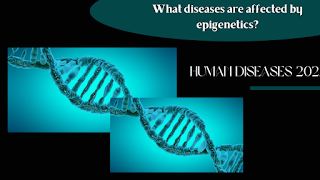What diseases are affected by epigenetics?
Human illnesses' genetic causes are being
identified at an unprecedented rate. Changes in the epigenome or the amount and
activity of proteins that govern chromatin shape are an increasing subclass of
disease-causing mutations. The focus of this article is on research that has
discovered human diseases caused by epigenetic dysregulation. Direct changes in
epigenetic markers, such as DNA methylation, have been
identified to impact imprinted gene regulation and may cause disease.
Disease-causing genetic alterations in epigenetic modifiers that change
chromatin in Trans or have a cis effect on chromatin conformation are also
described. Epigenetic modifications cause human illnesses such as Fragile X
syndrome, Angelman's syndrome, Prader-Willi syndrome and some cancers.
Your cells all have the same genes, yet they look and behave
differently. Epigenetics
helps define the function a cell will have as you grow and develop, such as
whether it will become a heart cell, neuron cell, or skin cell. Despite that
epigenetics does not include changes in DNA sequence; it can nonetheless alter
heritable gene expression through a variety of processes such as DNA methylation,
chromatin modifications and non-coding RNA. Anomalies in DNA methylation are a
common cause of illness. Imprinting illnesses like the Angelman,
SilvereRussell, PradereWilli and BeckwitheWiedemann syndromes, for example, are
frequently linked to changes in DNA methylation.
However, human
diseases caused by DNA methylation-based imprinting defects are not
confined to these inherited diseases; diabetes, schizophrenia, autism, and
cancer have all been linked to imprinting abnormalities. As evidenced by the
rare ImmunodeficiencyeCentromere instabilityeFacial anomalies (ICF) syndrome
caused by mutations in DNA methyltransferase 3B, abnormalities of the enzymes
that mediate DNA methylation can potentially contribute to disease (DNMT3B).
Rett syndrome, which is caused by mutations in the methyl-binding domain (MBD)
protein MeCP2, causes gene expression dysregulation and neurodevelopmental
disorder. DNA methylation abnormalities whether hypomethylated or
hypermethylated, can frequently contribute to cancer.



Comments
Post a Comment